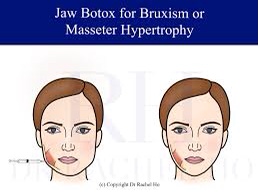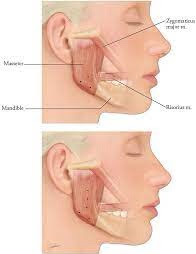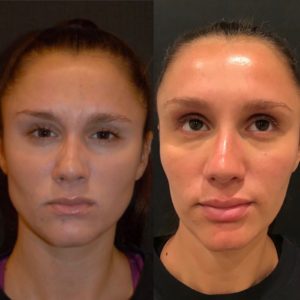BOTOX® is very well known by now for its many cosmetic applications to reduce fine lines and wrinkles. However, there are so many other applications for BOTOX that can be life-changing for those that need it.
TMJ and Bruxism
TMJ disorder (also referred to as TMD) and bruxism are two different conditions that can both have a negative effect on the proper functioning of the mouth and oral health. People that suffer from bruxism grind their teeth. TMJ Disorder is a condition that involves pain and improper functioning of the muscles and joints that attach the lower jaw to the skull. Bruxism can be caused by TMD, but bruxism can in turn also cause or worsen TMD.
Signs of bruxism and TMD
You suffer from bruxism when you unconsciously grind your teeth. Usually at night, though some people also grind (clinch) their teeth during the day, often during stressful periods.
Symptoms of bruxism include:
- Abnormal teeth wear and chipped teeth
- Sensitive teeth caused by enamel wear
- Pain and tension in the jaw and ears
Symptoms of TMJ disorder are very similar to those of bruxism. They include:
- Pain in the jaw, ears or face
- Pain or tension in neck or shoulders
- Constant headache
Both of these conditions can cause a person significant discomfort and pain, it can also cause Hypertrophy of the masseter muscle, which may lead to the appearance of a severe square jaw. Any major issues with the teeth that can be extremely expensive to fix. If the underlying problem isn’t addressed, any expensive dental work will ultimately fail, leading to even more expenses. Often, with proper diagnosis and planning, both of these issues can be reduced or eliminated.
BOTOX Treatment for TMJ AND Bruxism
Treatments with Botulinum Toxin such as BOTOX® , can provide tremendous relief from jaw soreness, headaches, and other unpleasant problems associated with Bruxism. Botulinum toxin treatments for Bruxism can also soften the appearance of the jawline.
Recently, botulinum toxin has proven to be an ideal treatment option for targeting and treating excessive muscle activity and spasticity. Many other treatments, such as anti-inflammatory medications and dental devices, do not address the source of the problem.
Although dental devices can successfully protect teeth from damage at night for bruxism sufferers, they are ineffective in stopping the painful side effects of teeth grinding. Also, the level of compliance with devices, such as night guards, is extremely low, and these devices are worthless if not being used.
By injecting effective doses of botulinum toxin directly into the masseter muscle (the large muscle that moves the jaw), the muscle is weakened enough to stop involuntary grinding of the teeth and clenching of the jaw. This significantly relaxes the muscle and reduces the wear and tear on the teeth due to grinding. Damage to the TMJ (temporomandibular joint) and headaches should be reduced or eliminated as well. Voluntary movements, such as chewing and facial expressions, are not affected at all by BOTOX. Treatment typically last 4-6 months
The beauty of this procedure is that the muscles that are problematic, bulky, and overworking are trained to relax. The more you continue to re-train the muscle, the more it atrophies.
This is good in two ways. First, it helps reduce or stop deleterious habits to prevent damage. Secondly, the muscle atrophies or shrinks. This has benefit in that as the BOTOX wears off, the muscle is weaker and smaller, making it incapable of producing as much damage. It also, often, allows the time between injections to be extended. So if someone begins getting injections every three months, they can start spreading the time out to every 4 to 5 to 6 months, eventually.
A welcomed side effect of BOTOX in the masseters is that it can create a slimming effect on the face, even an added benefit of possibly having pronounced cheekbones.
Being a dentist Dr. Bana has seen it all. From teeth wear inside the mouth, to changes in facial features, and most importantly the emotional distress caused by the constant pain. She took it upon herself to raise awareness, educate and treat TMD. Patients are often unaware that their symptoms are related to grinding, and therefore they forever grateful.
For consultation contact us Contact Us Munster IN – Restore Center for Aesthetics




